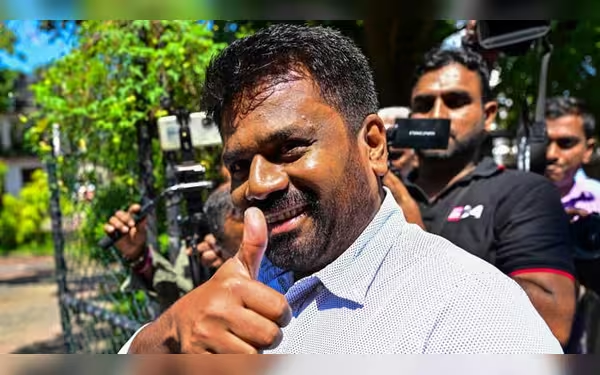Saturday, November 16, 2024 07:53 PM
Sri Lankan Candidate Promises IMF Deal Renegotiation
- Candidate vows to renegotiate IMF agreement.
- Plans to reduce income and sales taxes.
- Focus on addressing economic challenges.
 Image Credits: thenews.com.pk
Image Credits: thenews.com.pkSri Lankan presidential candidate Dissanayaka pledges to renegotiate IMF deal and reduce taxes amid economic challenges.
The political landscape in Sri Lanka is witnessing significant changes as the upcoming presidential elections draw near. One of the leading candidates, representing the People’s Liberation Front, is making headlines with promises to renegotiate the country’s deal with the International Monetary Fund (IMF). This move comes in response to the economic challenges that have plagued Sri Lanka in recent years, leading to widespread public discontent.
Bimal Ratnayake, a member of the party's politburo, recently spoke to AFP, outlining the party's intentions regarding the IMF agreement. He stated, "Our plan is to engage with the IMF and introduce certain amendments. We will not tear up the IMF programme." This indicates a willingness to work within the existing framework while seeking to make necessary adjustments that could benefit the citizens of Sri Lanka.
One of the key promises made by the candidate, Dissanayaka, who is 55 years old, is to reduce income taxes that were significantly increased under the administration of President Ranil Wickremesinghe. Additionally, he has pledged to cut sales taxes on essential items such as food and medicines. These proposals aim to alleviate the financial burden on the average Sri Lankan, who has been struggling with rising costs of living.
The IMF deal has been a contentious topic in Sri Lanka, as it involves strict economic measures that many believe have exacerbated the hardships faced by the populace. By proposing amendments to this agreement, the People’s Liberation Front is positioning itself as a party that listens to the concerns of the people and is willing to take action to improve their situation.
As the elections approach, the focus will undoubtedly be on how these promises resonate with voters. The ability of the People’s Liberation Front to effectively communicate their plans and demonstrate a clear understanding of the economic challenges will be crucial. Voters are looking for solutions that not only address immediate concerns but also pave the way for long-term stability and growth.
The political maneuvering surrounding the IMF deal highlights the broader economic struggles faced by Sri Lanka. As candidates like Dissanayaka present their visions for the future, it is essential for the electorate to critically evaluate these proposals. The outcome of the elections could significantly impact the direction of the country’s economic policies and the well-being of its citizens. Engaging in informed discussions and understanding the implications of these political promises will be vital for the future of Sri Lanka.













